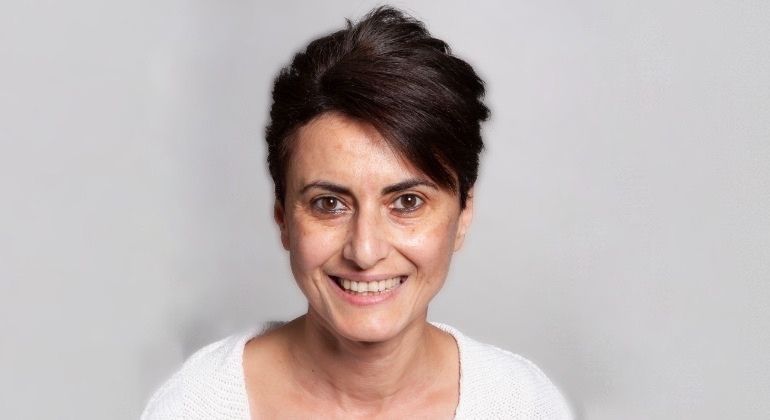Mount Sinai Researchers Discover New Approach for Use of Stem Cells to Improve Bone Marrow Transplantation

Mount Sinai researchers have discovered a way to enhance the potency of blood-forming stem cells, potentially opening the door to a new approach for bone marrow transplantation, according to a study published on February 27 in Cell Stem Cell.
The scarcity of blood-forming stem cells, known as hematopoietic stem cells (HSCs), severely limits bone marrow transplantation, which can cure many blood disorders and solid tumors. The Mount Sinai team reports that manipulation of metabolic activity around lysosomes, the storage and recycling centers within cells, can increase by more than 90-fold the potency of blood-forming stem cells in bone marrow transplantation.
“Hematopoietic stem cells lose their stem cell potential once they’re cultured in a dish, which limits their ability to be easily propagated in the laboratory,” says Saghi Ghaffari, MD, PhD, Professor of Cell, Developmental and Regenerative Biology in the Black Family Stem Cell Institute and The Tisch Cancer Institute at the Icahn School of Medicine at Mount Sinai, and lead investigator of the study. “In order for these stem cells to maintain optimal potency, they shouldn’t be constantly dividing—putting them under metabolic stress that can alter their health and longevity. Instead, they should be in a dormant, or quiescent, state. But maintaining quiescence of blood stem cells outside of the body has been challenging. We discovered that lysosomes are key to the dormancy of these cells. We further learned that repressing lysosomal activity—rather than their stimulation—enhances stem cell quiescence and potency, and may have therapeutic value.”
Through their extensive in vivo work in mice, the Mount Sinai scientists used an effective and specific lysosomal inhibitor that reduces lysosomal acidity and amino acid release in the cells. The net effect is to restore stem cells with activated lysosomes to a quiescent state. The study further found that the inhibition of glycolysis—the breakdown of glucose and other sugars by enzymes—also enhances quiescence and potency of hematopoietic stem cells, which are believed to rely on glycolysis for their energy.
Scientists have been trying for years to generate more HSCs in the laboratory for clinical use. “Our methodology is different from others in that it is based on quality rather than quantity,” explains Dr. Ghaffari, a stem cell biologist and recognized expert in blood disorders. “By restraining lysosomal activity we produce fewer blood-forming stem cells for bone marrow transplantation, but they work much better because we’ve preserved and enhanced their potency.”
This work could be used to generate blood stem cells from cultured pluripotent stem cells (master cells that can be turned into any type of mature cell), or to enhance the function of human blood stem cells for bone marrow transplantation, something that is being attempted in Dr. Ghaffari’s lab. It has also led to many new questions regarding the contribution of lysosomes to stem cell quiescence and potency and their potential therapeutic applications. Still another impact of her lab’s work could be identifying and targeting stem cells that propagate blood malignancies, including leukemia.
About the Mount Sinai Health System
Mount Sinai Health System is one of the largest academic medical systems in the New York metro area, with 48,000 employees working across seven hospitals, more than 400 outpatient practices, more than 600 research and clinical labs, a school of nursing, and a leading school of medicine and graduate education. Mount Sinai advances health for all people, everywhere, by taking on the most complex health care challenges of our time—discovering and applying new scientific learning and knowledge; developing safer, more effective treatments; educating the next generation of medical leaders and innovators; and supporting local communities by delivering high-quality care to all who need it.
Through the integration of its hospitals, labs, and schools, Mount Sinai offers comprehensive health care solutions from birth through geriatrics, leveraging innovative approaches such as artificial intelligence and informatics while keeping patients’ medical and emotional needs at the center of all treatment. The Health System includes approximately 9,000 primary and specialty care physicians and 11 free-standing joint-venture centers throughout the five boroughs of New York City, Westchester, Long Island, and Florida. Hospitals within the System are consistently ranked by Newsweek’s® “The World’s Best Smart Hospitals, Best in State Hospitals, World Best Hospitals and Best Specialty Hospitals” and by U.S. News & World Report's® “Best Hospitals” and “Best Children’s Hospitals.” The Mount Sinai Hospital is on the U.S. News & World Report® “Best Hospitals” Honor Roll for 2024-2025.
For more information, visit https://www.mountsinai.org or find Mount Sinai on Facebook, Instagram, LinkedIn, X, and YouTube.